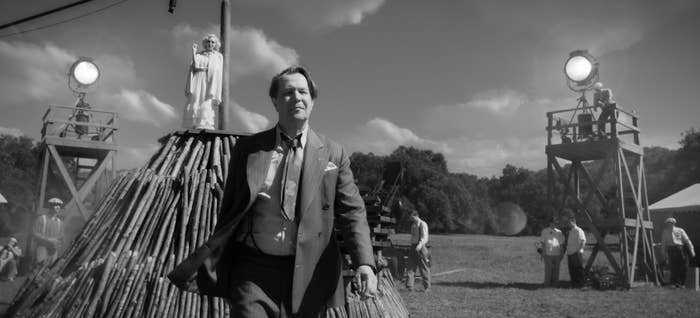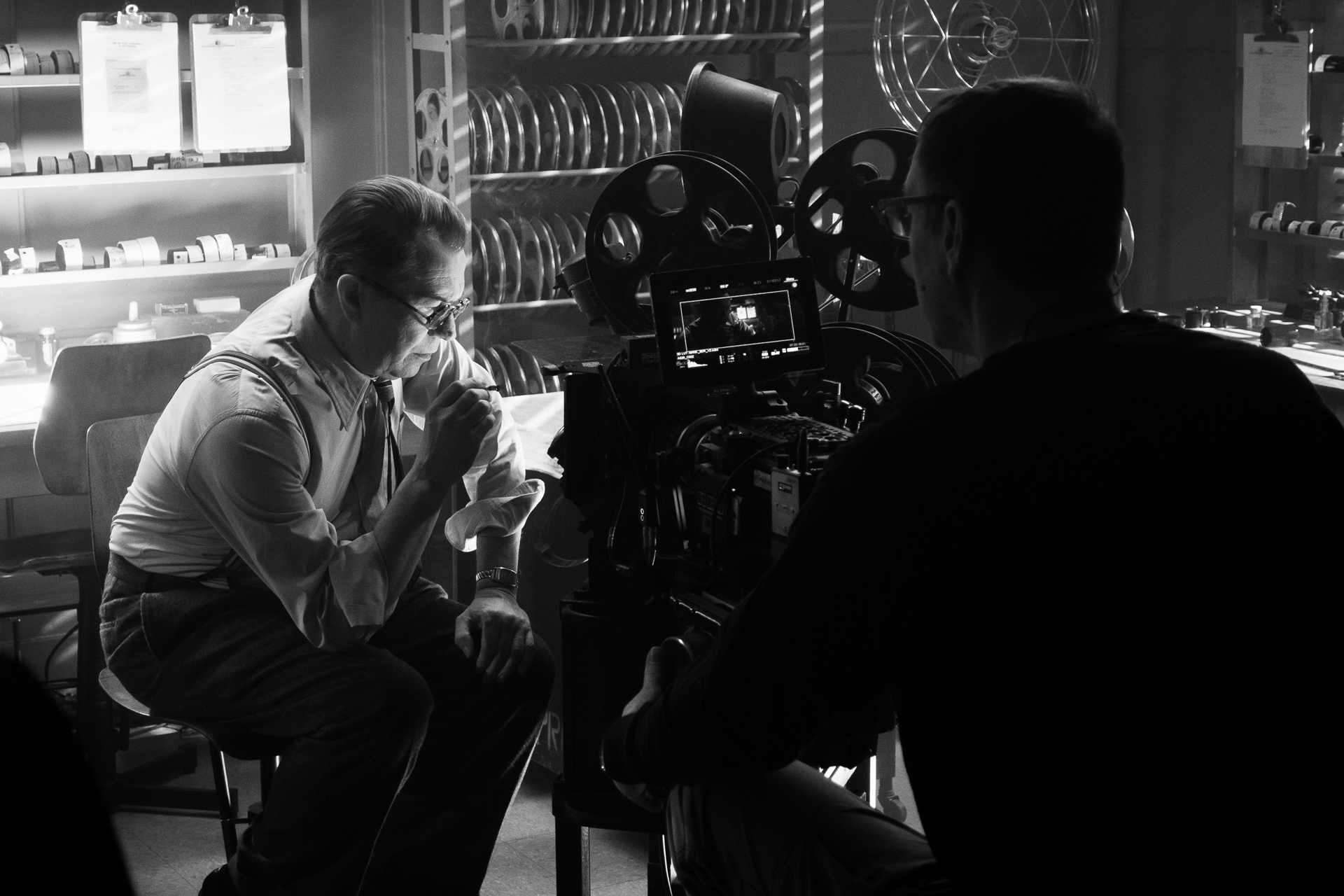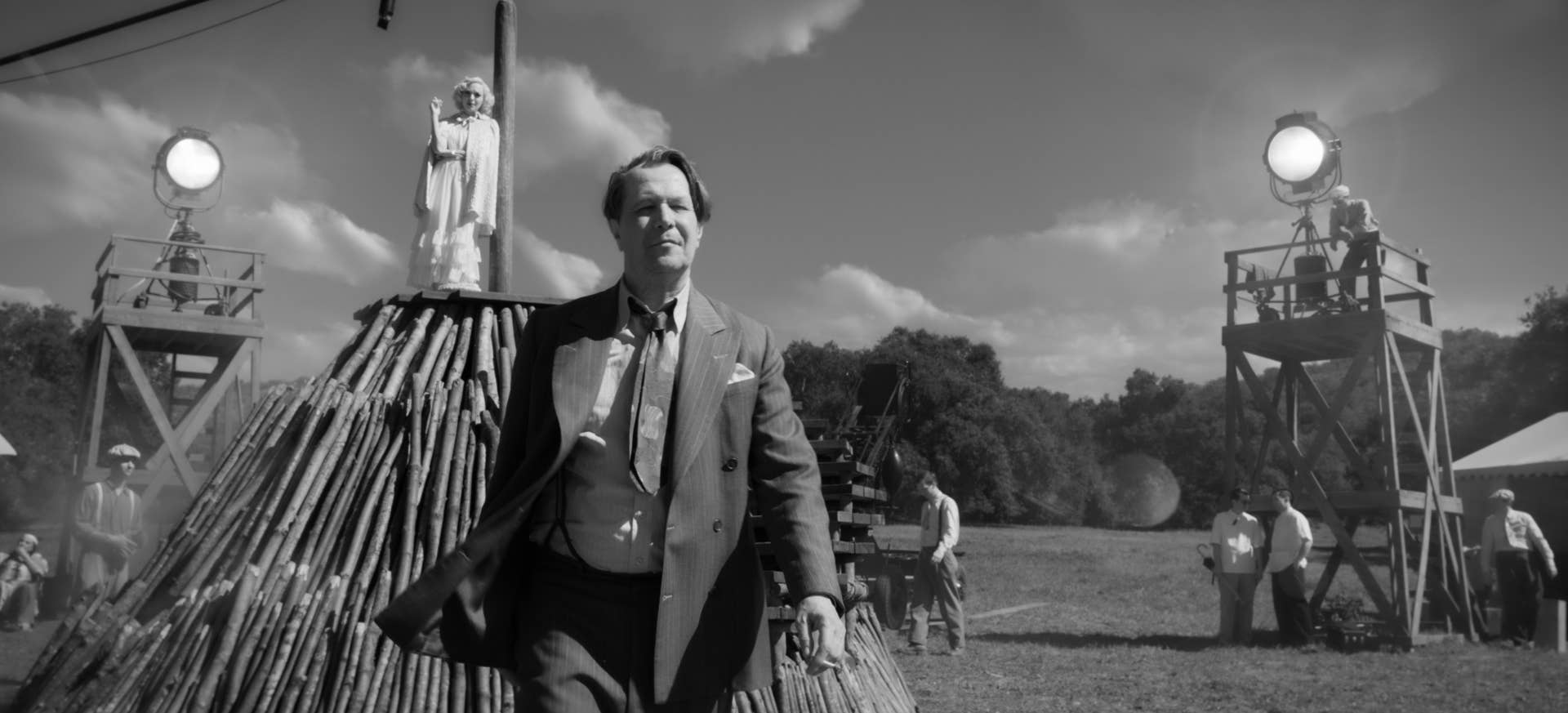
"It isn't enough to tell us what a man did. You've got to tell us who he was.” This quote from 1941’s Citizen Kane smartly understands what makes for compelling writing and filmmaking, and it’s one of the strengths of Mank—David Fincher’s latest film and his first since 2014’s Gone Girl. Set for a limited theatrical run on November 13 before dropping December 4 on Netflix, this long-awaited return is cause enough to celebrate. But cinephiles have cause for great excitement, as The Social Network director turns his masterful lens to Old Hollywood. Mank charts the story of screenwriter Herman J. Mankiewicz, or Mank for short, and his journey to pen Citizen Kane for master filmmaker Orson Welles. Yes, the movie is a biopic—one that might be most relevant to Turner Classic Movie viewers and Criterion Channel subscribers. But Mank is also a David Fincher project, which means the entire endeavor has its individual pieces elevated into a more substantial, compelling whole.
Mank sets its gaze on the 60 days in which the titular writer (Gary Oldman) finds himself tasked with scripting Welles’ (Tom Burke) sprawling epic. Welles and producer John Houseman (Sam Troughton) sequester a recently-injured Mank on a quiet desert ranch outside of Los Angeles to ensure he follows through. German nurse Freda (Monika Grossman) and British typist Rita Alexander (Lily Collins) attend to the writer as he works. As the script comes together, the movie uses flashbacks—a direct homage to the narrative structure of Citizen Kane—to revisit his time writing for famed Hollywood studio Metro-Goldwyn-Mayer. These moments offer a window into Old Hollywood and its denizens, including authoritative MGM head Louis B. Mayer (Arliss Howard) as well as Mank’s frequent intersections with newspaper publisher William Randolph Hearst (Charles Dance) and his wife Marion Davies (Amanda Seyfried). Viewers of Citizen Kane will know Mank drew from his time with Hearst and Davies to inform the movie’s overall story and main characters.
View this video on YouTube
Mank is a biopic, but one that’s aware of the limitations of the genre and actively works to transcend them. Biopics typically draw cynicism for their tendency to be too sprawling, award-bait-y, controlling estates, and desire to make their characters heroes. Fincher smartly avoids these trappings, thanks to an extremely focused script from his own father, Jack. Mank was originally set to be David Fincher’s follow-up after 1997’s The Game, but the project fell apart over the director’s insistence on shooting the film in black and white. Jack’s screenplay doesn’t hesitate to show not only Mank’s failings but the grueling machine that is moviemaking. Through a series of flashbacks, Mank fleshes out the inner workings of Classical Hollywood. The film’s opening third doesn’t skimp on showing lavish productions unfolding at MGM during Mank’s time there, ironically serving as a love letter to cinema in a year where we desperately need a reminder of the magic of movies.
But some things haven’t changed in the years following Hollywood’s Golden Age. Father Fincher’s script is fully aware of the less than rosy nature of the times and isn’t shy about shining a light on them: The Depression forces salary cuts. Hollywood elites mock Hilter’s early days and can’t comprehend the impending doom. Dinner conversations dovetail into heated debates about the nuances between communism and socialism. Capitalism proves to be quite a manipulating influence. Staunch principles lead to self-sabotage. There’s even a particularly nauseating election sequence that evokes the same anxiety many of us likely felt during the 2020 Election this week. Other biopics might go out of their way to highlight how these moments connect to today’s reality, but Mank is thankfully more subtle in its approach, as attentive viewers will naturally draw the comparison on their own.
David Fincher’s direction is known to bring the best out of a script, and it’s not surprising he’s able to elevate an archetypal biopic as well. He manages to further darken the shadows of Jack’s work, while also imbuing Mank with a certain joyousness I can’t say I’ve seen from him before. It’s clear Fincher loves this Golden Age as much as many fellow cinephiles do, and it quite literally shows. The early Old Hollywood sequences radiate loving adoration; Erik Messerschmidt’s cinematography lingers on production crew members, fanning out smoke for dramatic effect. Equally as impressive are the scenes set in William Randolph Heart’s palatial estate, which accurately convey the extravagant wealth. Whether it’s the spacious interiors or the on-grounds Zoo animals, it’s clear Hearst’s money had granted him the ability to live in a place that feels like a whole other planet—and one that’s certainly at stark odds from the Great Depression world lingering all around it.




